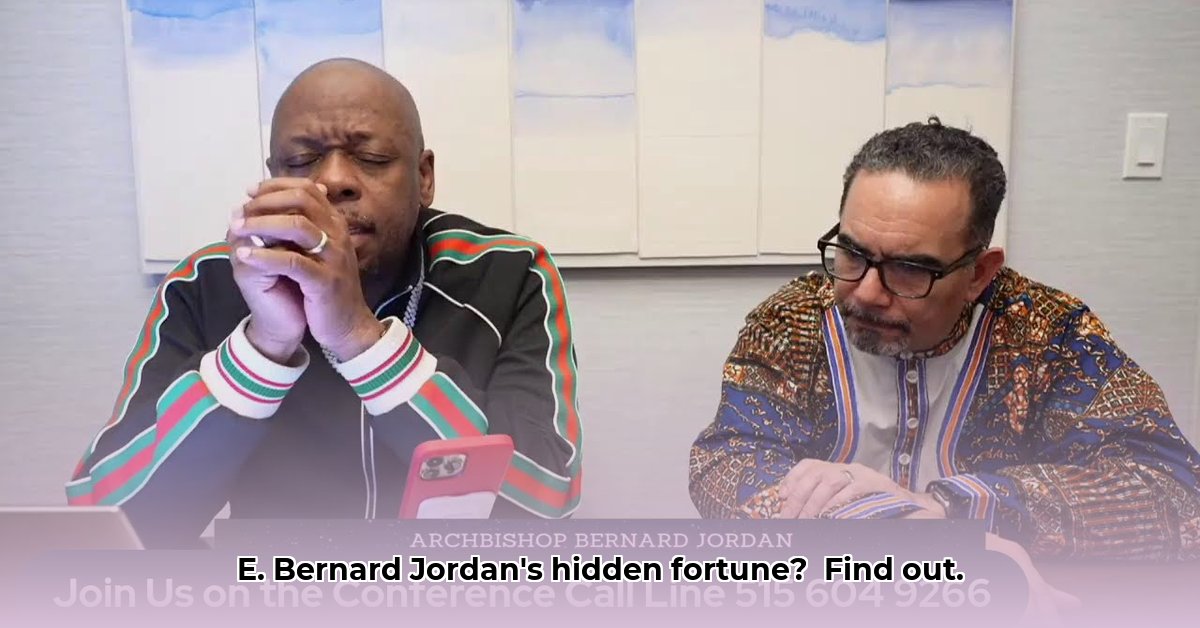
E. Bernard Jordan, leader of Zoe Ministries, embodies the complexities and controversies surrounding the Prosperity Gospel. This investigation explores his net worth, examining the theological underpinnings of his ministry, its financial practices, and its social impact. Understanding Jordan's wealth requires navigating a delicate balance between faith, finance, and ethical considerations. For comparison, see similar discussions on other prosperity preachers.
Jordan's Ministry and Rise to Prominence
Zoe Ministries, under Jordan's leadership, has experienced remarkable growth. His charismatic preaching style and the central message of the Prosperity Gospel—the belief that faith attracts financial blessings—have attracted a significant following. A key factor in his ministry's expansion was his television program, "Power of Prophecy," which significantly broadened his reach. This increased visibility likely translated into substantial financial gains through donations and other income streams. However, quantifying Jordan's net worth proves challenging due to a lack of publicly available financial statements from Zoe Ministries.
The Prosperity Gospel: A Theological Examination
The Prosperity Gospel links spiritual faith to material success. Adherents believe that God rewards strong faith with financial prosperity, emphasizing the importance of "sowing" (generous giving) to "reap" financial rewards. While this resonates with many, it has sparked intense theological debate. Critics argue that it distorts core religious teachings, overemphasizing material wealth and potentially exploiting vulnerabilities. They contend that this emphasis can overshadow the spiritual essence of faith and compassion. Conversely, proponents view the Prosperity Gospel as a motivational tool, fostering positive thinking and charitable giving. Understanding the nuances of this theological debate is crucial to analyzing Jordan's ministry.
Financial Transparency and Ethical Concerns
Determining E. Bernard Jordan's exact net worth is hampered by the lack of publicly available financial records for Zoe Ministries. This opacity fuels concerns about accountability and potential conflicts of interest. The absence of transparent financial reporting makes it difficult to assess the allocation of funds—how much supports charitable causes versus Jordan's personal wealth. This lack of transparency raises significant ethical questions regarding the stewardship of congregational funds within a religious context. How does the ministry's financial success reconcile with the potential for the concentration of wealth in the hands of its leader, rather than a broader distribution consistent with the ideal of shared prosperity?
Social Impact: Assessing the Ministry's Contributions
Zoe Ministries claims widespread philanthropic activities. However, concrete evidence of broader social impact requires further scrutiny. While anecdotal accounts of generosity exist, comprehensive, independently verified data is needed to assess the ministry's true contribution to society. Supporters cite various initiatives, but without detailed, verifiable information, it's difficult to objectively evaluate the scale and effectiveness of these programs. The question remains: Does the ministry's social impact genuinely align with the principles of the Prosperity Gospel?
Criticisms and Counterarguments: A Balanced Perspective
The Prosperity Gospel and ministries like Zoe Ministries have faced substantial criticism. Concerns exist about the potential for financial exploitation, the theological validity of its central tenets, and a lack of transparency regarding its financial practices. Skeptics question whether the focus on material gain overshadows spiritual growth and compassion. Conversely, proponents highlight the Gospel's positive impact, inspiring faith, fostering positive thinking, and encouraging charitable acts. Objectively weighing these opposing viewpoints is crucial for a balanced understanding.
Conclusion: Open Questions and the Path Forward
This investigation into E. Bernard Jordan's net worth highlights the complexities surrounding the Prosperity Gospel. While Zoe Ministries has undeniable financial success, the lack of transparent financial information hinders a definitive assessment of its practices and Jordan's personal wealth. The debate over the theological and ethical implications of the Prosperity Gospel remains ongoing. Increased financial transparency and further independent research are vital for a more complete understanding of Zoe Ministries' impact, both financial and societal. This exploration leaves many unanswered questions, reinforcing the need for ongoing scrutiny and open dialogue. The ultimate question remains: Does the prosperity of the ministry truly benefit the community it serves, or does it primarily serve the enrichment of its leadership?